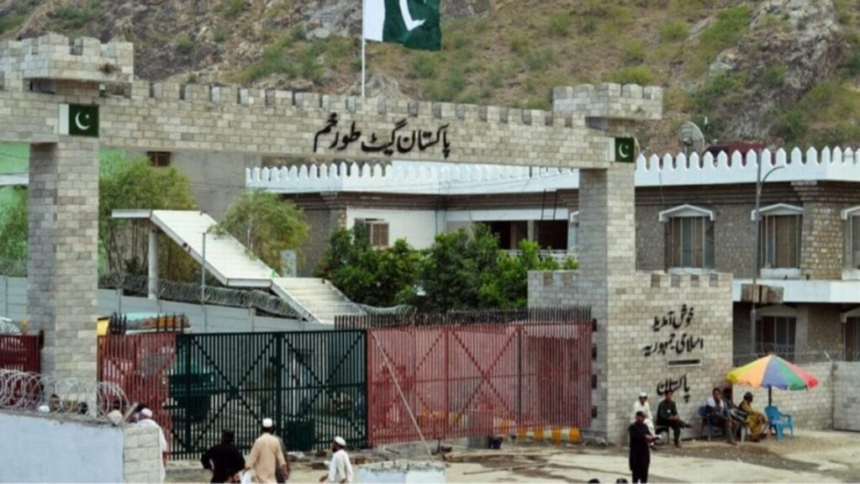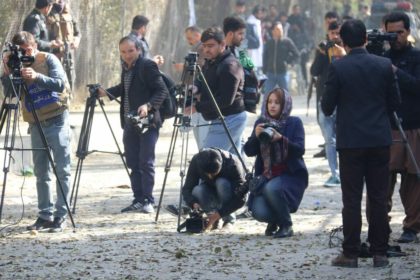RASC News Agency: More than 24 hours have passed since an alleged ceasefire was declared between Pakistan’s border forces and Taliban fighters, yet the main crossings at Torkham and Spin Boldak remain sealed. The closures have paralyzed cross-border movement, left thousands of civilians stranded in limbo, and exposed once again the Taliban’s inability to manage even the most basic functions of governance or diplomacy.
Reports from both sides of the Durand Line paint a grim picture of humanitarian and commercial disruption. Long convoys of trucks carrying food, medical supplies, and essential goods sit idle under the scorching sun, while families attempting to return to Afghanistan remain trapped in dire conditions. Local sources from Torkham told RASC that hundreds of commercial vehicles have been immobilized for over a day, and dozens of migrant families have been forced to sleep in the open without access to shelter, clean water, or food.
Traders and business owners have raised alarm over the mounting economic losses, saying the Taliban’s ineptitude and Pakistan’s reactionary border policy have crippled regional trade. The continued closure has already sparked dramatic price hikes across the southern provinces of Kandahar and Nangarhar, where food and fuel are becoming increasingly unaffordable for ordinary citizens.
The blockade follows one of the deadliest clashes in recent months between Taliban fighters and Pakistani border forces on Saturday night, which left heavy casualties on both sides. In their typical style of militant bravado, Taliban spokesman Zabihullah Mujahid claimed that 58 Pakistani soldiers were killed and 25 of Islamabad’s border outposts were seized by Taliban forces. Pakistan’s military, however, rejected the Taliban’s inflated figures, asserting that around 200 Taliban militants and affiliated fighters including members of the Tehrik-i-Taliban Pakistan (TTP) were killed in retaliatory strikes.
Taliban officials downplayed their losses, claiming only nine of their members were killed. The vast discrepancy between the accounts underscores the persistent information war and deep distrust defining relations between the two sides.
Meanwhile, local sources in Kandahar confirmed that Pakistani drones carried out targeted airstrikes on Spin Boldak on Sunday, further undermining the credibility of the so-called “ceasefire.” Although the Taliban regime has yet to comment on the nature or casualties of the strikes, analysts view their silence as another example of the group’s weakening command structure and reluctance to confront Pakistan directly despite its constant rhetoric of sovereignty and resistance.
Security experts warn that the renewed violence signals a historic rupture in Taliban–Pakistan relations. For decades, Pakistan nurtured and shielded the Taliban as a strategic proxy, yet the relationship has steadily deteriorated since the group’s return to power in Kabul. Islamabad accuses the Taliban of providing safe haven to TTP insurgents and Baloch separatists, while the Taliban leadership denounces Pakistan’s cross-border air raids as violations of Afghanistan’s territorial integrity.
The closure of Torkham and Spin Boldak has deepened Afghanistan’s already catastrophic humanitarian crisis. Hundreds of families remain stranded at the border, sleeping outdoors in freezing night temperatures. Aid workers report growing desperation, with shortages of food and medicine compounding the suffering of displaced families many of whom fled Taliban repression only to find themselves trapped between two hostile regimes.
Economists warn that if the crossings remain closed in the coming days, southern and eastern Afghanistan could face an acute food shortage, worsening an economy already paralyzed by international isolation and Taliban misrule. In markets across Kandahar, prices for wheat flour, fuel, and essential goods have surged by as much as 40 percent in a single week.
This latest crisis highlights the collapse of the Taliban’s foreign and domestic legitimacy. Once portrayed as a force of stability by their Pakistani patrons, the Taliban have instead plunged Afghanistan into economic ruin, regional isolation, and growing confrontation with nearly all of their neighbors. Their inability to engage diplomatically, coupled with their brutal domestic repression, has rendered them incapable of protecting the country’s borders or its people.
As Pakistan now struggles with the consequences of its decades-long policy of nurturing extremism, Afghanistan remains trapped under a regime that thrives on fear, propaganda, and ideological rigidity. The victims of this enduring dysfunction are the millions of ordinary civilians merchants, laborers, women, and children caught between two failed visions of power on either side of the Durand Line.






